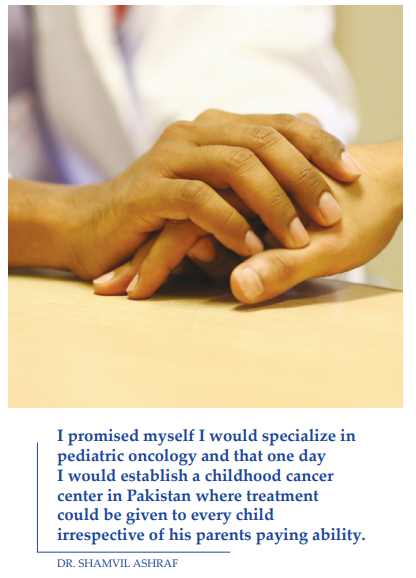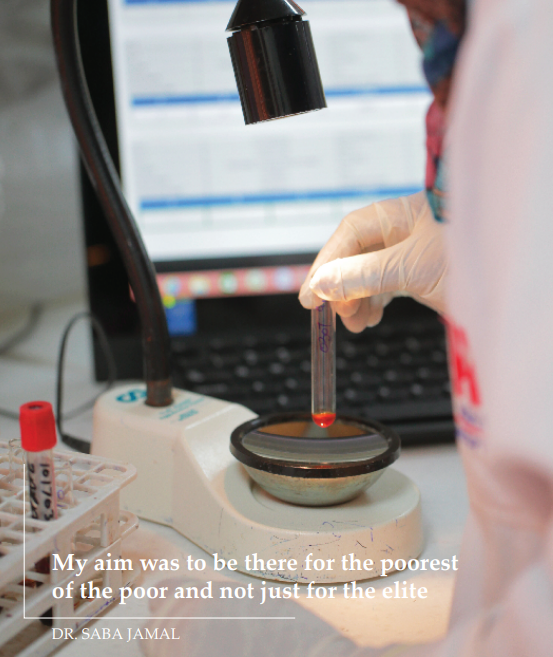The Change Maker
Pediatric Oncology Trailblazer
Dr. Shamvil Ashraf
Following medical school, Dr. Shamvil Ashraf, a pediatric oncologist, pursued a noble journey of serving humanity. His focus was more specific to provide free care to pediatric cancer patients. When Dr. Shamvil graduated in 1984, he wanted to care for children with cancer but there weren’t facilities in Pakistan dedicated to pediatric oncology. In 1980, Dr. Shamvil left for Ireland and the United Kingdom to train in pediatric oncology following the completion of his pediatric residency and fellowship. He returned to Pakistan in 1995, joining Shaukat Khanum Memorial Cancer Hospital & Research Centre in Lahore. After some time he moved to Karachi and worked in private practice while also collecting money to fulfill his dream to diagnose and treat children with cancer-free of charge.
In 1999, he established the Children’s Cancer Foundation with the help of Dr. Abdul Bari and raised about $400. Undeterred, Dr. Shamvil treated children with cancer, first in a single room before moving to a daycare center and later a small hospital space. Children’s Cancer Hospital began providing daycare chemotherapy, pharmacy, and outpatient clinic services. He used a private hospital for admitting patients while the foundation paid the bills.
Eventually, the hospital grew to take on a floor of a bigger hospital. With the determination to see more Pakistani children diagnosed and treated along with the help of My Child Matters grant, Children’s Cancer Hospital began nurse training in 2009 to go along with institutional fellowships to train pediatric oncologists.
By 2014, the hospital had three floors and provided a comprehensive childhood cancer unit. In its early years, Children’s Cancer Hospital treated a couple of dozen new patients a year. By 2014, it was 500 new cases a year. As the unit grew, the ultimate goal was to build a new hospital. Dr. Shamvil began fundraising and even purchased land for a new facility. But then Dr. Bari– a founding board member of Children’s Cancer Foundation – approached with the idea to merge, creating a children’s cancer unit in Korangi Campus.
The merger meant having access to labs, diagnostics, and other services already created at Indus while utilizing its education and training opportunities. The two institutions merged in 2014, and construction of a new pediatric complex began in 2015. Children’s Cancer Hospital relocated in 2017 to the Korangi campus.
Since the merger, the number of new pediatric cancer patients registered has doubled to 1,000 a year. Now, the current 150-bed pediatric unit provides space for all pediatric medicine, surgery, and oncology care needs. The unit handles all of Indus’ pediatric cancer patients from birth through age 16. 45 % of patients are from Karachi, 35 % from interior Sindh, 15 % from Baluchistan, and the remainder from other parts of the country and Afghanistan.
The Indus Hospital maximizes oncology unit’s space by not admitting patients’ for chemotherapy. The 28-bed chemotherapy daycare unit administers treatment from 8 am until 10 pm.
The pediatric oncology unit collaborates with other institutions in Karachi as well as across Pakistan through its work as part of the Pakistan Society of Pediatric Oncology. Since 2013, Indus is offering a two-year fellowship program in pediatric oncology. Indus also offers nursing training courses that attract nurses from across Pakistan and other countries. In 2019, six nurses from outside Pakistan participated in the course. Nearly 300 nurses have received training at Indus under the My Child Matters grant.
The Indus Hospital currently has nine pediatric oncologists. It also educates pediatricians across Pakistan. It also conducts awareness campaigns at other hospitals while bringing in physicians for workshops.
Indus is the only center in Pakistan with four subspecialties in pediatric oncology: leukemia, lymphoma, sarcoma and solid tumor, and neuro-oncology.
“We’re growing in all directions of services, research, and academics,” Dr. Ashraf said. “Indus is now in a state of leadership of pediatric oncology in Pakistan. We’ve developed the capacity to not only build our unit but other units to improve the infrastructure and care.” That growth is essential to meet the pediatric cancer needs of Pakistan. Of the 8,000 new cases per year in Pakistan, only about half reach a pediatric oncology unit. And more than 25 % of patients who reach a treatment center have advanced disease. Indus is turning that tide. It has seen a significant decrease in left during treatment (LDT), patients who are seen in the clinic but leave for whatever reason. Specialized care has contributed to that number declining to 6 % from 15 % just five years ago.
Abandonment and access to quality care are challenges in Pakistan, but Dr. Shamvil believes a bright future is ahead, thanks in part to these collaborations.

Creating a new benchmark
Dr. Saba Jamal
A solid-white building behind the Korangi Campus houses The Indus Hospital’s Blood Center. Inside the building sits Dr. Saba Jamal, who is behind the country’s one-of-a-kind centralized blood banking system.
Dr. Saba is a well-known name in the Pakistani medical community. Her work on centralizing the country’s blood banking system and making it at par with international standards has been a topic of discussion in various medical circles.
“I came to Indus because here we are working towards what is best for the patient, it does not have any financial motivation for earning. We make possible improving the standards at a much lower cost,” she says.
In just seven years, Dr. Saba managed to create the country’s largest centralized blood banking system in the country, with nearly 94 % of it now based on voluntary donation.

A graduate of Sindh Medical College, Dr. Saba went to the US where she did three boards in atomic pathology and then a diploma of American Boards in Clinic Pathology. She followed that up with a fellowship in histopathology and then boards in hematology.
“When I came back from the US, I started working as a hematologist and a histopathologist. During that period I realized that despite our labs being so up to date, our blood banks were not up to the par and no one was working on improving them either,” she says. “I realized that if you do the blood banking correctly then you can’t make money out of it,” Dr. Saba adds. “It’s a very expensive undertaking to produce safe blood in Pakistan, and all of the blood is collected through replacement donors. So, it rests on the patient’s families to go and get the donors because there is no factory for blood and the patient’s family has to go and get blood.”
This creates a major problem for patients who require transfusions such as those suffering from thalassemia, hemophilia, or cancer patients who require blood before their chemotherapy. “Cancer patients run into major problems because even their relatives don’t come to meet them because they know they will be asked for blood. So, it’s a very tragic situation for them.”
With no work done on voluntary blood donation in the country, the country was facing a race against time — of nearly 50 to 70 years — behind the world in centralized blood banking. “I changed the blood banking practices at Ziauddin to see if it was doable by training the staff and brought them up to the mark, and that is when I realized it is possible to do it in Pakistan and started looking for partners with whom I can work with,” she shares.
With her work at Ziauddin steadily gathering attention, another well-known name in the medical community Dr. Abdul Bari, approached her and offered her to be a part of the Indus Hospital. “I shared my dream with him and he welcomed me aboard. My aim was to be there for the poorest of the poor and not just for the elite,” Dr. Saba. By February 2012, Dr. Bari got the necessary funding — two months after their initial meeting — with work on the blood center starting from April 1. The Indus Hospital Blood Center opened its doors in October 2013, becoming the first centralized blood center in the country working on voluntary blood donation.
“In just seven years we have grown from one blood center to four regional blood centers and running 22 blood banks connected to it and I hope that Pakistan’s healthcare system will hugely benefit from it.” says Dr. Saba.



